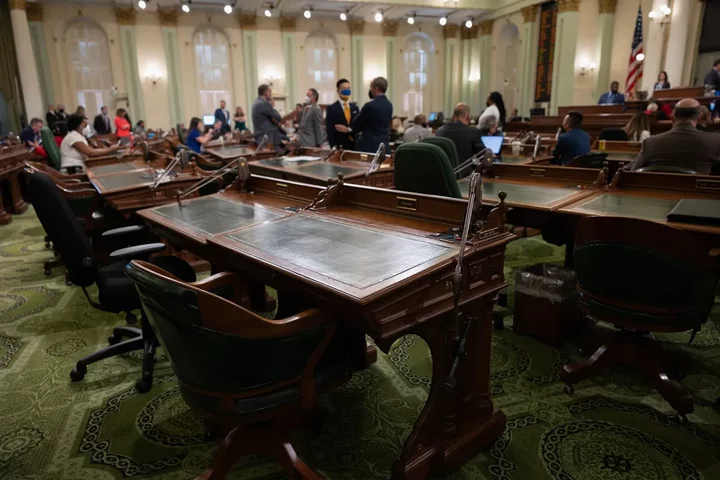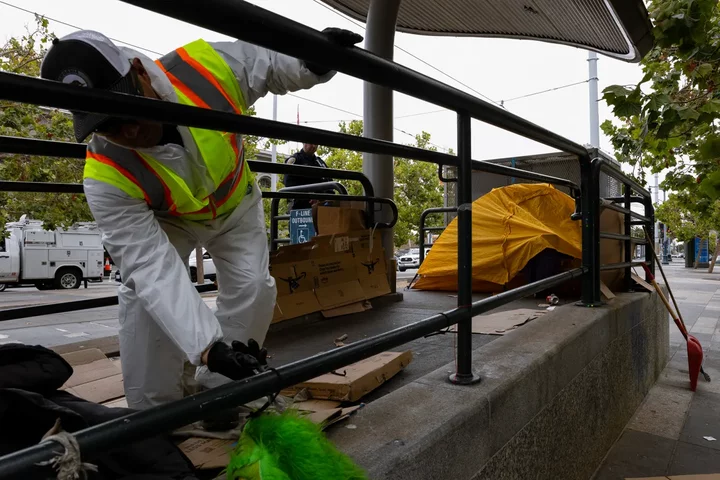Humboldt is Getting its First Hydrogen-Powered Bus at the End of this Month
Dezmond Remington / Wednesday, March 5, 2025 @ 11:14 a.m. / Transportation
A hydrogen-powered bus parked in front of College of the Redwoods. Photo courtesy of HTA.
After years of planning, research, and engineering development, Humboldt County is getting its first hydrogen-powered bus at the end of this month.
It’s been a long time coming. The Humboldt Transit Authority received a $38.7 million grant back in 2022 from the California State Transportation Agency’s Transit and Intercity Rail Capital Program to build a fleet of hydrogen buses, four years after initial studies began. The process wasn’t as easy as simply buying one and having it shipped here; HTA worked with Canadian bus manufacturer New Flyer to develop a bus that can drive about 400 miles without refueling. A typical hydrogen bus can only cover about 300, and an electric bus doesn’t even crack 150. HTA ordered the bus last year, but supply chain issues prevented it from being ready until now.
It’ll be the first of many. In about three years, all 16 HTA buses will be a hydrogen-powered Xcelsior Charge H2TM.
It won’t be a development totally unique to Humboldt. The California Air Resources Board voted back in 2019 to phase out all carbon-emitting buses by 2029, and the HTA’s bus fleet has to be at least 25% carbon-free by next year.
The hydrogen fueling station for the buses, located at the bus depot, will also be usable by anyone that owns a hydrogen-powered vehicle, though HTA’s general manager Gregg Pratt doesn’t think there’s anyone here who owns one.
“It’s an exciting time,” Pratt said in an interview with the Outpost yesterday. “We’re the only agency north of the Bay that’s started [using hydrogen] yet.”
BOOKED
Today: 8 felonies, 8 misdemeanors, 0 infractions
JUDGED
Humboldt County Superior Court Calendar: Today
CHP REPORTS
1175 MM199 N DN 11.80 (HM office): Trfc Collision-1141 Enrt
ELSEWHERE
RHBB: Toyota Prius Slides Over Embankment on Greenwood Heights Drive Near Eureka
Governor’s Office: Governor Governor Newsom proclaims Ronald Reagan Day
Governor’s Office: California celebrates 129 new CHP officers ready to protect and serve the Golden State
Governor’s Office: Governor’s Office demands Kristi Noem learn to Google before sending stupid letters: California works with ICE to deport criminals
They’re Making the Kids Lock Up Their Phones at Sunny Brae Middle School, and Everyone Seems to Agree That it Has Been Awesome (at Least According to the School District)
LoCO Staff / Wednesday, March 5, 2025 @ 10:44 a.m. / Education
Press release from the Arcata School District:
At its June 18, 2024 meeting the Arcata School District Board of Trustees approved the purchase of Yondr Phone Pouches for use at Sunny Brae Middle School (SBMS) for the 2024/2025 school year. SBMS staff had taken notice of the same concerning device usage trends that prompted Governor Newsom’s recent signing of AB 3216, the Phone-Free School Act. In a press release celebrating the signing of AB 3216, the Governor’s office shared that:
“Excessive smartphone use among youth is linked to increased anxiety, depression, and other mental health issues. A recent Pew Research Center survey found that 72% of high school and 33% of middle school teachers report cell phone distractions as a major problem. Common Sense Media found that 97% of students use their phones during the school day for a median of 43 minutes. Combined with the U.S. Surgeon General’s warning about the risks of social media, it is urgent to provide reasonable guardrails for smartphone use in schools.”
Bedazzled Yonder bags.
At SBMS the implementation of new cell phone management protocols has been a huge success. Every morning students have their phones sealed in a magnetized pouch and at the end of the school day student phone pouches are unsealed using a magnet. While seeking approval for the phone pouch program, SBMS Principal, Angela Landy, was questioned by the school board and superintendent as to how this new program would be different from strictly enforcing the existing policy and taking cell phones away from habitual offenders. Principal Landy shared that due to the cost of some of the student devices, staff can be reluctant to take them away themselves and students are sometimes extremely resistant to handing over their phones. The new pouch program removes this conflict and honors that there may be addictive elements to student cell phone usage. Under the new program, phones remain in the possession of students, but are turned off and sealed so that they do not cause a distraction at school.
SBMS Teacher Phil Purcell shared that “it’s actually been kind of amazing - students are playing games and really talking to each other at break and lunch time. I was optimistic, but it has been even better than expected.”
When asked for comment, Arcata School District Superintendent, Luke Biesecker, echoed Mr. Purcell’s sentiments. “I have to admit that I was initially a little uncertain about the program. Cell phones are a reality and students do need to learn how to appropriately use them. However, in listening to Principal Landy and her staff, the pouch program may be the most age-appropriate way for helping to teach middle school students time and place appropriateness.” In addition to an unlocking magnet in the office, there are unlocking magnets in each classroom giving teachers the flexibility to unlock student devices in case of an emergency or for use during a special project.
Biesecker further shared that while he has not received any negative feedback directly regarding the program, he does know that a few parents expressed concern to Principal Landy. “I attended the SBMS Back to School Night this year and when Ms. Landy brought up the cell phone pouches, I thought we were going to get booed out of the building. Instead, we received an overwhelming, audible applause. I think parents know better than anybody how difficult it is to manage middle schooler cell phone use.”
When asked about the impact on students, Principal Landy shared that one student reported to her how freeing it was not to have to worry about checking their phone during the school day. “Some of the students have even started decorating their phone pouches and really personalizing them.”
Principal Landy pictured with SBMS 7th graders Emilia Yorton and Abby Morgan.
When asked about the biggest impact the phone cases have had from their perspective, SBMS 7th graders Emilia Yorton and Abby Morgan shared that they no longer see students on their phones in the bathroom.
While there seems to be general consensus that the Yondr pouches have had a positive impact on the school climate at SBMS, some of the improvement may be due in part to a number of other measures put in place over the last few years - including student discipline reforms, increased social emotional supports for students, equity trainings for staff, and student attendance improvement efforts. However, both Biesecker and Landy are quick to give substantial credit to the new cell phone management program, sharing that student discipline referrals, student suspensions, and student absenteeism numbers are all down significantly at this point in the school year, compared to last year.
Have Federal Agents Served Warrants at California’s Capitol? The Legislature Doesn’t Want You to Know
Ryan Sabalow / Wednesday, March 5, 2025 @ 7:26 a.m. / Sacramento
Lawmakers gather on the Assembly floor at the state Capitol on May 31, 2022. Legislative leaders have refused to provide records that could show whether federal agents are investigating lawmakers in corruption cases. Photo by Miguel Gutierrez Jr., CalMatters.
###
This story was originally published by CalMatters. Sign up for their newsletters.
###
California’s legislative leaders don’t think the public should know whether federal agents are investigating state lawmakers for public corruption, nor do they believe taxpayers should know how much of their money the Legislature is spending on criminal defense lawyers.
Following recent reports that Southern California Sen. Susan Rubio has been questioned in a federal public corruption investigation, CalMatters filed requests with the state Assembly and Senate seeking copies of federal law enforcement subpoenas and search warrants dating to 2020.
CalMatters also sought under the California Legislative Open Records Act invoices or other records showing how much money the Legislature has spent since 2020 on legal bills related to federal criminal investigations.
Identical letters from the Rules Committees for the Assembly and Senate cited four reasons for denying the record requests including “the public interest served by not making the record public clearly outweighs the public interest served by disclosure of the record.”
The offices of Assembly Speaker Robert Rivas and Senate President Pro Tem Mike McGuire didn’t respond to CalMatters’ interview requests.
But the secrecy alarms open-government advocates.
“The public absolutely has a right to know whether … one of their representatives or public officials is under criminal investigation,” said Sean McMorris of California Common Cause, a non-profit, non-partisan organization that advocates for government transparency and accountability.
David Loy, legal director for the First Amendment Coalition, another government transparency advocacy group, said the citation about the disclosure not serving the public interest “is the last refuge of the scoundrel and is invoked whenever somebody wants to withhold something inconvenient.”
The Legislative Open Records Act, first signed in 1975, gives lawmakers and their staff members more discretion to withhold records than most other public agencies have under the similar California Public Records Act.
But Loy said that even if they have a legal right to withhold records, public agencies usually have broad discretion to release them. In other words, they could release these records in the interest of transparency if they wanted to.
“Even if (secrecy) might be allowed under the letter of law in some circumstances, that is not a position that I think serves the public well,” he said. “We should err on the side of disclosure. The public has a right to know.”
In addition to the public interest citation, the Senate and Assembly letters cited three other reasons for denying the records. It said the Legislative Open Records Act allows documents to be “exempt from mandatory disclosure” if the records:
- “Are in the custody of the Legislative Counsel.”
- Are prohibited or not required for release by state or federal law.
- Involve issues of attorney-client privilege.
“Records responsive to your request, to the extent they exist, fall within the scope of the foregoing exemptions and will not be produced,” the letters said.
Rubio’s office didn’t answer questions Tuesday about whether she or her office has received any search warrants or subpoenas, who her attorney is, and whether taxpayer funds were spent on her legal defense.
Federal officials have not identified Rubio by name in the corruption probe, which has ensnared a handful of other officials in San Bernardino County, Compton, Commerce and Baldwin Park.
However, no one else matches the description of “Person 20,” who was accused in recently released federal court documents of asking for $240,000 in bribes from a cannabis company and accepting $30,000 in illegal campaign contributions.The allegations stem from when Rubio was a member of the Baldwin Park City Council.

The Senate Rules Committee this week rejected CalMatters’ request for records that might detail which officials have been linked to federal public corruption investigations as well as how much taxpayers have been paying for criminal defense attorneys.
Rubio emphatically denied accepting bribes in an interview with CalMatters’ reporting partner, CBS News, that aired in January. But when asked if she denied that she was “Person 20” she responded, “I’m not saying that.”
“I’m just saying that you read the report,” she continued. “And whatever is happening there is happening there, but I think that (investigators) would have to reach out to me in order for me to be part of any of this.”
Rubio’s office previously told the Los Angeles Times in a statement that she “volunteered hours of her time” aiding the authorities in their investigation and that she “has no reason to believe that she would be included in any criminal allegations.”
Legislative Republicans called for a Senate Ethics Committee investigation, but the committee declined, saying long-standing Senate rules prohibit investigation of allegations that are more than three years old.
“Since the alleged activities occurred many years ago, the committee does not have jurisdiction to review this matter,” the committee’s chief counsel, Erin V. Peth, told CalMatters last month.
Assembly Republican Leader James Gallagher, a lawyer who represents the Chico area, said that everyone, including lawmakers, has a right to be presumed innocent in criminal investigations.But taxpayers also have a right to know, he said, “what kind of taxpayer money has been spent defending people in federal investigations.”
First-Of-Its Kind Court Order Halts Sweep of California Homeless Camp
Marisa Kendall / Wednesday, March 5, 2025 @ 7:22 a.m. / Sacramento
A city worker picks up the belongings of James Harris found outside of his tent in front of the Ferry Building in San Francisco during an encampment sweep on Aug. 9, 2024. Photo by Manuel Orbegozo for CalMatters
###
This story was originally published by CalMatters. Sign up for their newsletters.
###
The Bay Area city of Vallejo is putting California cities’ newfound power to clear homeless encampments to the test.
A federal judge last month stopped the city from dismantling the makeshift shelter of 64-year-old Evelyn Alfred, which she erected nearly two years ago on an empty strip of land next to a residential neighborhood. The ruling proves that, even as more cities in California crack down on encampments with sweeps and criminal charges, there are pathways open for unhoused people to fight back.
“I think now what this shows is that there is hope,” said Andrea Henson, an attorney who represents Alfred and also leads the Berkeley-based nonprofit aid organization Where Do We Go?
Before the U.S. Supreme Court ruled last summer in a case out of Grants Pass, Oregon, Alfred’s win might not have been a big deal. Back then, legal precedent said it was “cruel and unusual” to punish people for sleeping outside if they had nowhere else to go. As a result, cities had to be careful to offer shelter before clearing a camp. If they didn’t, a judge might very well step in and stop the sweep.
That all changed in June, when the court caused a dramatic shift by finding, in Grants Pass v. Johnson, that cities can ban people from setting up homeless encampments even if there are no shelter beds available.
The recent order stopping Vallejo from clearing Alfred’s camp appears to be the first such federal injunction since the Grants Pass decision, according to several legal experts interviewed by CalMatters.
“Cities and other governmental entities have been using the Grants Pass decision as if it was a green light (to clear encampments),” said Anthony Prince, one of the attorneys representing Alfred. This ruling, he said, proves that thinking is wrong.
Representatives from the city of Vallejo did not respond to CalMatters interview requests.
Many city leaders and even California’s Democratic governor, Gavin Newsom, had cheered the Supreme Court decision, assuming it would give local governments freedom to remove camps that had taken over sidewalks, city parks and other public spaces. Advocates for the rights of unhoused people were appalled, worried cities would now indiscriminately criminalize people just for being homeless.
But this recent Vallejo case shows it’s not so simple. As a result, legal experts and other attorneys who represent homeless plaintiffs throughout the state are paying attention to Alfred’s fight to stay put.
“I think we’re all watching closely to see what the courts will do,” said Ron Hochbaum, a law professor and director of the Buccola Family Homeless Advocacy Clinic at the University of the Pacific.
Evelyn Alfred’s court battle
The dwelling Alfred is fighting to keep is made out of tarps, wood and other materials, and has a roof, windows and a locking door, according to court documents. Her lawyers argued it’s the only thing that protects Alfred — who walks with a cane and wears a back brace due to her osteoarthritis and other medical conditions — from the elements.
The city of Vallejo first informed Alfred of its intent to remove her camp in October, and Alfred sued shortly after. In November, a federal judge temporarily blocked the city from clearing Alfred’s camp by issuing a temporary restraining order — an order that lasts until the court holds a hearing on the issue.
In February, the court granted a preliminary injunction, which is a much bigger win: It lasts longer and comes only after both sides have made extensive arguments in court and the judge has had ample time to deliberate. This appears to be the first one issued in federal court since Grants Pass. It means Alfred can stay put until her case settles or goes to trial.
Alfred is on several waitlists for affordable housing, but hasn’t yet been offered a placement, according to her lawyers. When she asked where she could go if she were to leave her campsite, the city’s attorney said she could not camp anywhere else in Vallejo, according to court documents. The city does not provide shelter or transitional housing. Therefore, Alfred’s lawyers argued, she would be put in harm’s way if she were forced to leave her camp, especially due to her age, physical and mental disabilities and, as a woman, her vulnerability to sexual assault.
U.S. District Judge Dena Coggins sided with Alfred.
“Removing Plaintiff’s shelter while knowing Plaintiff has no alternatives is likely to expose her to more dangerous conditions than she currently faces by depriving her of protection from the elements, hygiene facilities, and access to life essentials, creating a known and particularized danger to Plaintiff’s safety and welfare,” she wrote.

City workers sweep clean the area of a former homeless encampment on Merlin Street in San Francisco on Aug. 9, 2024. Photo by Manuel Orbegozo for CalMatters
If the city knowingly puts Alfred in danger, that could violate her right to “due process” under the 14th Amendment, Coggins wrote.
The city, on the other hand, argued it should be allowed to remove Alfred’s camp because the camp presents health hazards caused by human waste, her makeshift dwelling violates multiple building codes, and in erecting the dwelling, she damaged a city-owned fence.
“Plaintiff has been properly noticed and provided with additional time to remove her encampment,” attorneys for the city wrote in a court filing. “The City must now be allowed to enforce its law and remove Plaintiff’s encampment.”
But Coggins found no proof that Alfred’s camp presents any “weighty” health and safety concerns.
Now the case will continue on toward a trial or settlement. The city has filed a motion to dismiss, which Coggins is scheduled to hear in May.
What does this mean for future homeless plaintiffs?
Before 2018, homeless plaintiffs often used the 14th Amendment (the basis for Alfred’s win) and the 4th Amendment (which protects against unreasonable searches and seizures by the government) to challenge encampment sweeps in court.
Then, the federal Ninth Circuit appellate court ruled in Martin v. Boise that punishing unhoused people for camping in public if they have nowhere else to go violates the 8th Amendment’s ban on cruel and unusual punishment. After that, the 8th Amendment became the weapon of choice for lawyers representing unhoused people.
And it got results. In 2022, lawyers using the 8th Amendment to sue San Francisco won a major victory: an order that stopped the city from enforcing several anti-camping laws as long as there weren’t enough shelter beds available.
Then, last summer, the U.S. Supreme Court ruled that Grants Pass was not engaging in cruel and unusual punishment by banning encampments despite a lack of shelter beds. Suddenly, the 8th Amendment was off the table. Now, homeless plaintiffs and the lawyers who represent them are turning to other strategies. The Vallejo case proves that those can still work, even as cities throughout California ban encampments.
Alfred’s attorneys also claimed the city of Vallejo violated the Americans with Disabilities Act by failing to accommodate Alfred’s disabilities as it tried to clear her camp. Coggins disagreed because the city granted Alfred more time to move, and granted her request for help packing her belongings.
“I think we’re all watching closely to see what the courts will do.”
— Ron Hochbaum, law professor, University of the Pacific
But legal experts said disabilities act claims are likely to pop up in future cases. In a 2023 survey of homeless Californians, one in five said they used a cane, walker, wheelchair or other mobility aid, according to the UCSF Benioff Homelessness and Housing Initiative. Survey participants also reported that shelters and subsidized housing weren’t accessible.
“That’s certainly an issue,” said Laura Riley, a social justice attorney and law professor at UC Berkeley. “We know that people who are unhoused disproportionately have disabilities. The plaintiff in this case has multiple disabilities, both mobility and mental health disabilities. So making sure that they honor the protections of the ADA for the unhoused population is important. And we know that that’s not happening, especially during sweeps.”
Alfred’s injunction may not stand alone for long. The same lawyers who represent her also sued the city of Berkeley to stop the removal of a camp at 8th and Harrison streets. Another lawsuit is attempting to stop an encampment sweep in the Marin County town of Fairfax.
“Until localities and the state make the appropriate investments in shelter and housing,” Hochbaum said, “this litigation is going to continue.”
OBITUARY: Benjamin Lee Lewis, 1954-2025
LoCO Staff / Wednesday, March 5, 2025 @ 6:56 a.m. / Obits
Benjamin Lee Lewis passed away on February 25, 2025 at the age of 70, surrounded by his loving family.
Ben was born in Hokkaido, Japan and immigrated to the United States at the age of two with his younger brother Ken and his mother Toki after the tragic death of his father. His father Robert was killed by lightning while serving for the United States Armed Forces in Japan.
Ben was a graduate of Freshwater Elementary, Winship Junior High, and Eureka High Schools. He was very active in athletics, football being his favorite. He was very proud of being on an undefeated football team while at Eureka High.
After high school, he joined the United States Air Force, where he served for four years and earned a honorable discharge.
After serving his country, he gained employment with PG&E as a certified welder at the King Salmon Nuclear Power Plant. He proudly retired after 33 years of service.
Ben loved spending time at his family’s cabin. As a young boy his grandfather took Ben and his brother Ken to the cabin teaching them to hunt, fish and log. This encouraged Ben’s life-long love of spending every free moment at the cabin. He carried on this tradition by teaching his children the same love of being at the cabin especially fishing.
Ben’s other passion was being a Corvette owner. He looked forward every week to Corvette Coffee.
Ben was also a proud member of the Calvary Baptist Church.
Ben is survived by his loving wife Sandy of 32 years. They were married after reconnecting at their 20th high school class reunion. Ben is also survived by his five children: Robert Lewis, Sarah Lewis (Ben), Matthew Hillyard (Sara), Jeffrey Hillyard (Roxana), Jamie Stokes (John) and numerous grandchildren and great grandchildren. He is also survived by his sister Heidi, nephew Ken and many other family members. And we can’t forget his loving dog, Pearl.
He was predeceased by his grandfather Emmett Lewis, his father Sgt. First Class Robert Milton Lewis, his mother Toki Hipner, his step-father Ray Hipner, his brother Kenneth Lewis, mother-in-law Beverly Thompson, and his mentor Smitty.
His family would like to thank Hospice of Humboldt and UC Davis medical staff for their care. We would also like to give special thanks to son-in-law Ben and nephew Ken for their unending support at UC Davis and for being bedside with Ben through his final moments.
Services followed by a celebration of life potluck will be held on Saturday, March 15 at 11 a.m. at the Calvary Baptist Church 3400 F Street Eureka.
In lieu of flowers donations can be made in honor of Ben Lewis to Hospice of Humboldt 3327 Timber Fall Court, Eureka 95503.
###
The obituary above was submitted on behalf of Ben Lewis’ loved ones. The Lost Coast Outpost runs obituaries of Humboldt County residents at no charge. See guidelines here. Email news@lostcoastoutpost.com.
(AUDIO) Brett McFarland Talks About Upcoming ‘Straight Outta Humboldt’ Tour, Time in Prison and How Music Saved His Life
Andrew Goff / Tuesday, March 4, 2025 @ 4 p.m. / On the Air
Brett McFarland live in the KSLG studio
(AUDIO) Brett McFarland on KSLG
Brett McFarland has been having a bit of an extended moment here in Humboldt. Four months ago, the local farmer-turned-viral local music video star grabbed ahold of the regional consciousness with the release of the clip for his song “Humboldt” — off the album Humboldt, of course. That video has racked up over 300,000 views on YouTube as of this writing and he’s subsequently churned out a handful of highly produced follow-ups.
Is it time to take this show on the road? Brett thinks so.
This week, Brett stopped by the KSLG studios in Old Town to talk with DJ Rhi Marie about his plans to tour with his newly assembled band The Freedom Riders. The plan is to kick off said tour — we’re going with the “Straight Outta Humboldt Tour” — with a show at the Arcata Theatre Lounge on March 22.
How’d we get here? In the interview above, Rhi Marie digs into Brett’s musical beginnings, his time in prison and how a return to music after a long time away revitalized his spirit. They also discuss his latest song, “Street Signs,” which Brett wrote to commemorate 165 years since the Wiyot Massacre.
Tune in.
For More Audio Interviews From the Humboldt Airwaves,
-GO HERE-
Yurok Tribe Issues ‘Urgent’ Measles Announcement, Then Clarifies: No Confirmed Cases in Humboldt or Del Norte Counties
Ryan Burns / Tuesday, March 4, 2025 @ 3:57 p.m. / Health , Public Safety
An “urgent health advisory” posted to the Yurok Tribe’s Facebook page this afternoon sparked alarm by referring to “a measles outbreak affecting our region,” but public health officials later clarified that there have been no confirmed cases of the highly contagious virus reported in Humboldt or Del Norte counties.
The initial message, signed by Yurok Director of Health Services Dr. Jacqueline J. Bae, was meant to convey general public health guidance in response to a measles outbreak that began in Texas and has since spread to nine states, including California (which was apparently the “region” being referred to in the post).
The Tribe’s Facebook post was later edited to add more information, including the following clarification: “Three cases [statewide] occurred in February, with no new cases reported in March. The California Department of Public Health has not specified the exact locations of these cases.”
The Del Norte County Public Health Department announced this afternoon that there have been no confirmed cases of measles in the county recently, though it advised, “now is the time to make sure you and your children are up to date on vaccines.”
A spokesperson with Humboldt County’s Department of Health and Human Services likewise confirmed that there have not been any measles cases in Humboldt County this calendar year.
Here’s the Tribe’s Facebook post:











